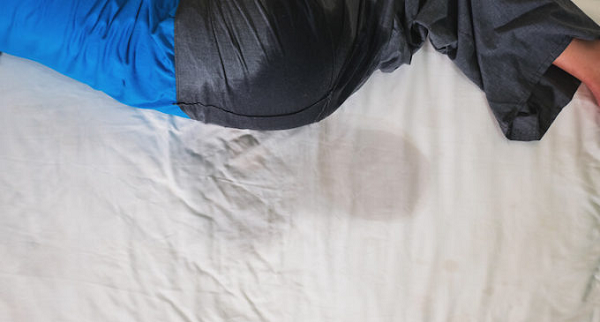
Discomforts of persistent bedwetting among adults
The ability to control bowel and bladder movements is required of a person so as not to disgracefully soil him or herself in public since both urine and bowel have offensive smells. The ability to have control over or restrain one’s bowel and bladder movements is termed as continence.
The flip side of continence is incontinence, which also refers to the lack of voluntary control over urination or defecation.
Advertisement
Bedwetting
Bedwetting is a kind of incontinence, hence it is called urinary incontinence or enuresis in medical practice.
Accordingly, urine incontinence is the accidental or unintentional urination in children or adults who are at an age where they should be able to have control of their bladders.
Empirical findings show that girls usually obtain bladder control before boys do. In some communities, bedwetting has been stigmatised, hence the bedwetter feels psychologically traumatised.
Among the Tongu Eʋes, including Mepe for example, a bedwetter is stigmatically referred to as “aɖuɖɔgoo, yaayaa” (spilling urine container).
As such, adult bedwetters usually find it embarrassing or uncomfortable to seek help.
Bedwetting occurs usually during nocturnal sleep, even though it can occur during daytime sleep too.
As such, there is diurnal enuresis (wetting during the day), nocturnal enuresis (wetting during the night), primary enuresis (occurs when the child has never fully mastered toilet training) and secondary enuresis (occurs when the child did have a period of dryness, but then returned to having periods of incontinence)
Even though bedwetting is a standard developmental stage for some children, it can be a symptom of underlying diseases in adults. Researchers asserted that about two per cent of adults experience nocturnal bedwetting, which can be attributed to a variety of causes and may require medical treatment.
According to the American Academy of Pediatrics (AAP), nocturnal enuresis affects five million children older than age six in the US, and it occurs more frequently in boys than in girls. Also, most children with bedwetting experience it at night.
Types
Urine incontinence can be classified by the symptoms of or circumstances leading to the uncontrolled urine leakage.
Accordingly, urine incontinence types are stress incontinence (occurs during sneezing, coughing, laughing), urge incontinence, overflow incontinence, functional incontinence (due to physical or mental impairment) and mixed incontinence (usually, a cocktail of stress and urge incontinences).
Aside the foregoing typologies, urine incontinence may equally be classified as overflow incontinence and total incontinence.
Overflow incontinence, also called chronic urinary retention, occurs when the bladder cannot completely empty upon passing urine.
This causes bladder distension. A person affected by overflow incontinence may pass small trickles of urine very often, with the feeling that the bladder is never fully empty.
On the flip side, a urinary incontinence is termed as total incontinence when it is severe and continuous. Accordingly, total incontinence may cause the affected person to constantly pass large amounts of urine, even at night.
The person may also pass urine in large volumes only occasionally and leak smaller amounts in between.
Causes
It is trite knowledge that urinary incontinence can be caused by everyday habits, underlying medical conditions or physical problems. A thorough medical examination usually reveals the underlying causes.
It is known that certain drinks, foods and medications may act as diuretics — stimulating the bladder and increasing urine volume, thereby making the bladder full frequently or causing nocturnal incontinence.
Substances such as alcohol, caffeine, large doses of vitamin c, chocolate and carbonated drinks among several others are known causes of temporary urine incontinence.
Persistent urine incontinence on the other hand may be attributed to pregnancy-related hormonal changes, weakening of ladder muscles due to vaginal childbirth, aging, menopause, enlarged prostate, prostate cancer, and certain neurological disorders.
Apart from the foregoing causative factors, bedwetting among children may be due to poor toileting, small bladders, delayed ability to hold urine, poor sleep habits and improper hormonal functioning.
What is more revealing is that most children who wet the bed have at least one parent or a close relative who also suffered from bedwetting as a child.
Complications
Complications of chronic urinary incontinence include, but are not limited to skin problems such as rashes, urinary tract infections and negative impacts on the psycho-social life of the bedwetter.
For example, a nocturnal bedwetting adult may find it difficult to go to bed, mingle with or sleep overnight at a friend’s place.
Sometimes, the bedwetter is hesitant to urinate during the day because of the feeling that he or she may be dreaming that his or her bladder is full.
Undoubtedly, urinary incontinence, especially at night, can cause the bedwetter to restrict his or her social activities and interactions, knowing that other people know of his or her bedwetting, which is stigmatised among healthy and responsible adults.
It is sad to hear that some parents physically abuse their bedwetting children.
Despite its causes and complications, urinary incontinence and its associated risks can be prevented by maintaining a healthy weight, practicing pelvic floor exercises, avoiding bladder irritants (alcohol, caffeine, etc.), eating more fibre to prevent constipations and avoiding smoking.
Advisedly, therefore, a person who starts experiencing urine incontinence ought to see a healthcare provider, especially a urologist, to determine and treat the root cause of the incontinence.
Early detection and treatment can prevent the persistence of the incontinence.
Lower self-esteem
Adults or older children who wet their bed have lower self-esteem, restrictions on social activities and are at risk of physical and emotional abuse.
Also, adult bedwetters can become depressed and have lower self-esteem, as the condition often has a significant impact on their education and career choices.
Bedwetters need help, so help a bedwetting child or adult in diverse ways to overcome it. Disclosing a friend’s bedwetting challenge to others can lead to stigmatisation, depression and possible suicide.
A friend indeed is one who can be a confidant to the other in need.
The writer is a health service administrator, Email Address: [email protected]



